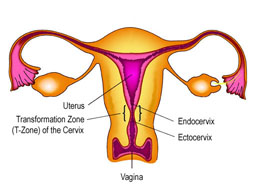
What type of cancer is it?
Cervical cancer is the type of cancer that starts in the cervix. It is the opening to the womb from the vagina. The cervix is covered with a layer of skin like cells on its outer surface, called the ectocervix. The area where cervical cells are most likely to become cancerous is called the transformation zone (T-zone). This is the area just around the opening of the cervix that leads on to the endo-cervical canal.
Cervical Cancer tends to occur during midlife. Most of the women diagnosed with the disease are between 35 and 55 years of age
What causes cervical cancer?
Most cervical cancer is caused by a virus called human papillomavirus (HPV). There are over 100 different types of HPV, but not all are cancerous. Â Major percentage of cervical cancer cases is caused by two types of the virus, HPV-16 and HPV-18, often referred to as high-risk HPV types.
One can be affected by HPV due to unprotected sex with multiple partners; smoking; taking birth control pills and engaging in sex at an early age.
Is it fatal?
Cervical cancer is the second most common type of cancer for women worldwide, but because it develops gradually, it is also one of the most preventable types of cancer. Regular Pap smear tests can detect changes in cervical cells before they turn cancerous. If these changes are treated early on, cervical cancer can be prevented. Couple of vaccines [Gardasil and Cervarix] is available for the prevention of HPV infection.
What are the symptoms?
- Bleeding from the vagina that is not normal, such as bleeding between menstrual periods, after sex, or after menopause
- Pain in the lower belly or pelvis
- Pain during sex
- Heavy or unusual vaginal discharge that may be watery, thick, and possibly have a foul odor
- Increased urinary frequency
- Pain during urination
In case you are facing these issues, it may or may not be cervical cancer but something else altogether. So do not ignore any of these symptoms and schedule a doctor’s appointment at the earliest.
Dr. Munjaal Kapadia stresses on the fact that most women who have cervical cancer have no symptoms till it’s very late. Hence, screening in the form of Pap Smears & regular visits to your Gynecologist is essential.
What are the treatments available for this?
Depending on how much the cancer has grown, there may be one or more treatments or a combination of treatments available. Some of the treatments include the following;
- Surgery, such as a hysterectomy and removal of pelvic lymph nodes with or without removal of both ovaries and fallopian tubes
- Chemotherapy
- Radiation therapy
The above mentioned are general treatments that are available for the disease. In case you are affected by this; your gynecologist/oncologist will provide you with a suitable treatment tailor made for your requirements.
Finding out that you have cancer may change your life. You may feel like your world has been torn apart and you might feel out of control. Talking with family, friends, or a counselor can really help.   Â
Dr. Munjaal V Kapadia, [M.S. (ObGyn), D.A.E.S (Germany), D.U.E. (France)] is the Director of Namaha Super Specialty Hospital for Women, Mumbai & Ramaben Hospital, Navsari.
Follow him on @ScissorTongue on twitter
- team_itemmom
- March 18, 2016
- 0 Comment







